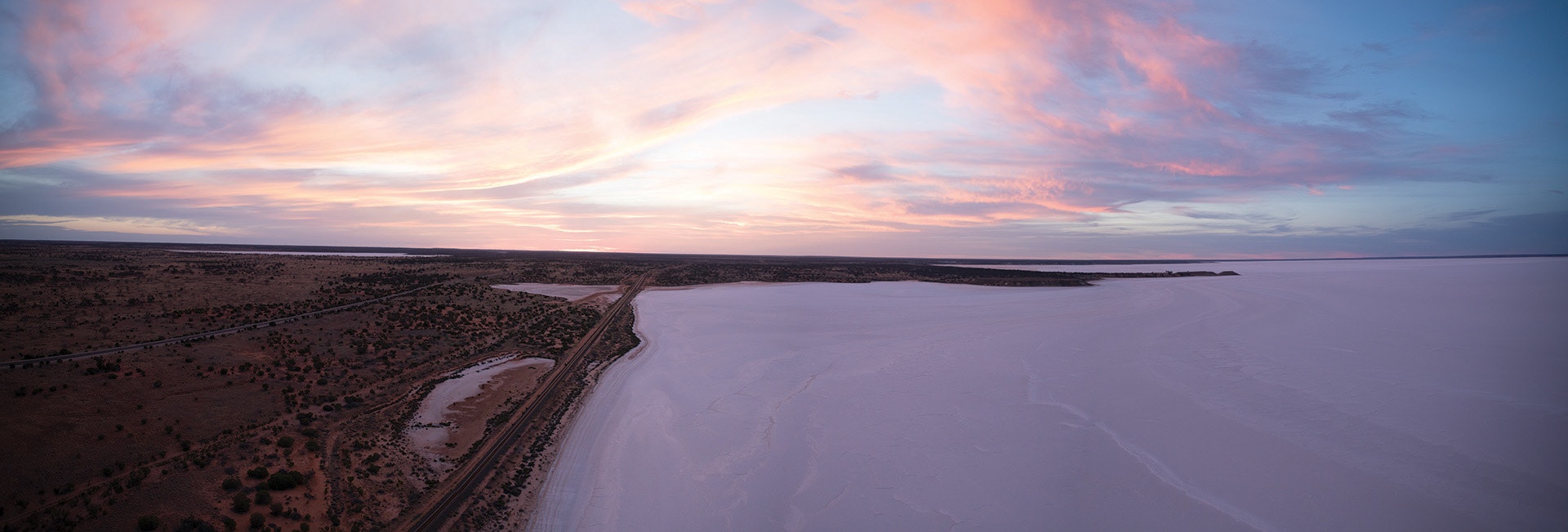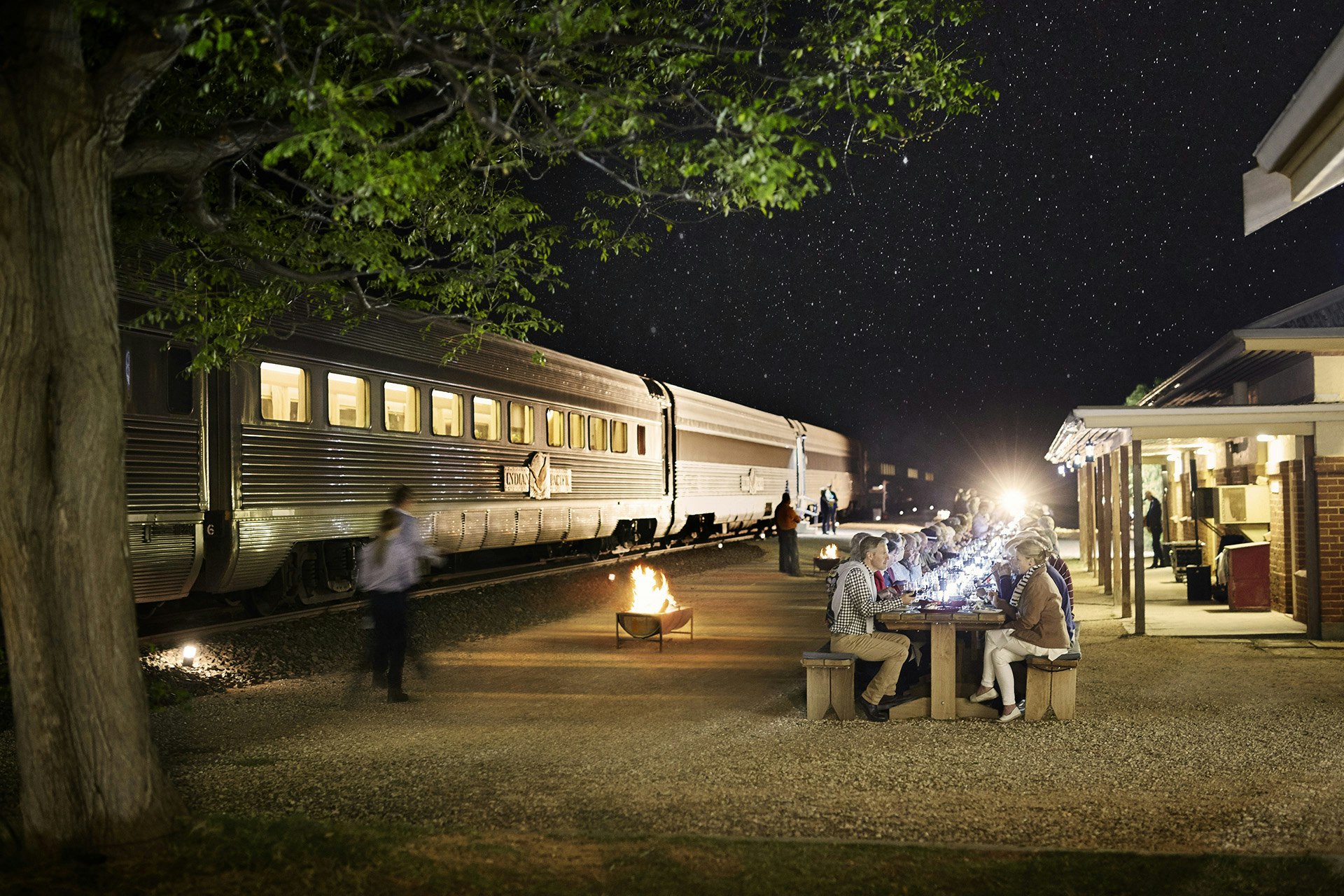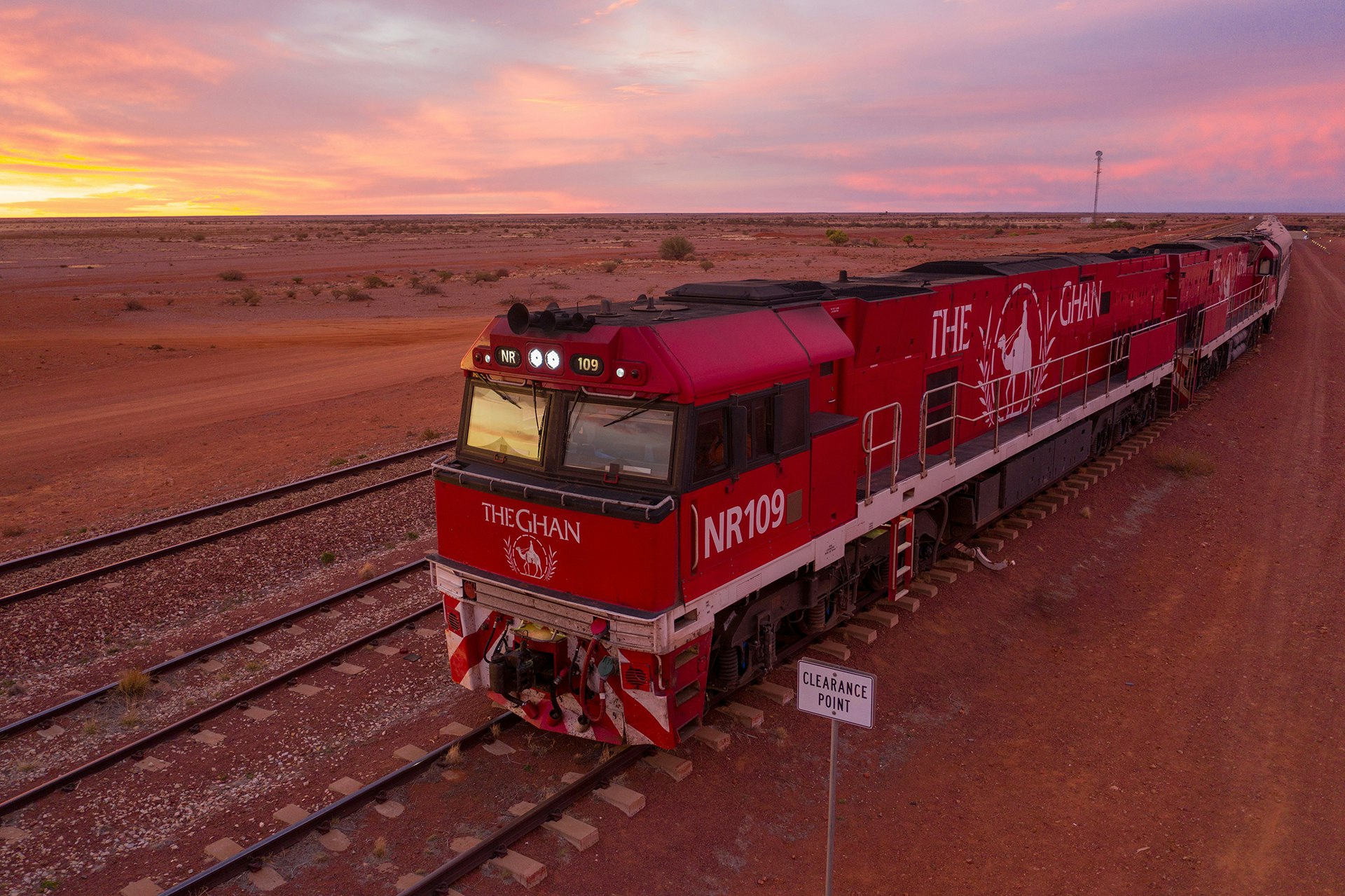
About the Indian Pacific
With its bold wedge-tailed eagle emblem symbolising the scope, range and significance of each epic journey, the Indian Pacific traverses mountain ranges, passes through arid deserts and goldfields, through rocky valleys and desert savannahs on its transcontinental crossings.
Stepping aboard the mighty train, you’ll feel a great sense of anticipation as this unforgettable Australian adventure begins to unfold. Whether you’re journeying from the Indian Ocean to the Pacific or the other way round, you’ll be making your way across the longest stretch of straight railway track in the world.
When 10,000 people lined the East Perth Terminal in 1970 to herald the first unbroken rail journey across the country – a new, seamless connection between the Indian and Pacific Oceans – an historic Australian milestone was achieved and the Indian Pacific took its name from the coasts it joined.
This incredible 4352 kilometre crossing is one of the world’s great rail journeys. An adventure of contrasts, it encompasses the towering majesty of the Blue Mountains to the barren expanse of the Nullarbor, and every goldmine, ghost town and grapevine in between. From inside and outside your cabin, you’ll be captivated by the vast beauty of this magnificent country.

HISTORY OF THE INDIAN PACIFIC
1890s
As Australia marched toward Federation, the promise of a transcontinental railway to link the isolated west with the fast growing east coast persuaded Western Australia to align with the rest of the colonies. At the time, a skeleton rail link existed but the west to east line was missing a section between Kalgoorlie and Port Augusta spanning almost 2000 kilometres.
1912 – 1917
In one of Australia’s most remarkable surveying and engineering feats, two construction teams worked for more than five years to fill the 2000 kilometre gap. On 17 October 1917, the two construction teams – one starting from Port Augusta and other from Kalgoorlie – finally met after working for five years on what is the longest straight stretch of railway ever built in Australia. It was constructed using the most basic tools – pick and shovel, carthorse and camel. The teams joined the line at what is now known as the tiny South Australian siding of Ooldea on the Nullarbor Plain.
1917 – 1996
At 10.15 am on 25 October, 1917, the first eastbound passenger train, the Transcontinental Express, departed Kalgoorlie for Port Augusta travelling on the new rail line. While the line was completed, different sections had varying rail ‘gauges’ meaning travellers departing Sydney or Perth were required to change trains at least five times to complete their journey.
The ‘Tea and Sugar train’ carried vital supplies to the isolated worksites and fledgling towns had sprung up along the new transcontinental line. Workers depended on the weekly train for every necessity, and each time it crossed the Nullarbor Plain it brought something different: livestock, a movie car, a bank car to make financial transactions, a Christmas car with travelling Santa – it even occasionally smuggled in alcohol to the workers. From the late 1970s it also provided health care to the isolated populations. The Tea and Sugar train made its final voyage in 1996, but carriages have been preserved at the National Railway Museum.
1951
Luxury cars were introduced on the service between Adelaide and Perth, at a reported cost of £50,000 each to construct. They featured air conditioning, refrigeration, and hot and cold water. Guests enjoyed the first hot showers ever installed in a rail carriage.
1970
It was not until 1969 that an uninterrupted rail link from the Indian Ocean in the west to the Pacific Ocean in the east existed. The newly named Indian Pacific train embarked on its inaugural transcontinental journey on 23 February 1970, arriving in Perth. It is this rich history that has made the Indian Pacific one of Australia’s most treasured icons.
It took more than half a century before the Indian Pacific completed the first unbroken journey from coast to coast, and more than 10,000 people welcomed the historic train in Perth.
1982
A group of railway volunteers issues a cheeky challenge to the treeless Nullarbor, meeting at the outpost of Cook to plant 600 saplings. They called their project ‘The Greening of Cook’ and hoped that in time, an oasis would mark their effort. The Nullarbor defeated them – the site remains treeless to this day.
1983
The Crystal Brook-Adelaide line converts to standard gauge, allowing the Indian Pacific to operate via Adelaide for the first time.
1995
Following the conversion of the Adelaide-Melbourne line to standard gauge, the Indian Pacific makes a promotional trip from Perth to Brisbane via Melbourne over six days in June.
2000
The Indian Pacific carries the Olympic flame from Kalgoorlie to Port Augusta as part of the Sydney Olympics Torch Relay. The Indian Pacific operates its first Outback Christmas Train, travelling through remote locations including the Nullarbor sidings of Watson, Cook, and Rawlinna.
2020
In 2020, the Indian Pacific celebrates 50 years of transcontinental journeys. While the accommodation, Off Train Excursions and menus have evolved over time, one thing remains the same – the sense of adventure and camaraderie between guests makes an Indian Pacific experience one to remember.
Indian Pacific in numbers
| Average length of train | 878m (includes two locomotives and 35 carriages) |
| Average weight of train | 1710 tonnes |
| Length of track | 4,352km |
| Length of journey | 65 hours Sydney to Perth – 4,352 km |
| Average speed of train | 85km/hr (max speed 115km/hr) |
| Symbol | The wedge-tail eagle, Australia's largest bird of prey. Its massive two-metre wingspan symbolises the epic journey spanning the continent. |
| Average number of carriages | 35 carriages including guest carriages, crew quarters, restaurants, lounges and power vans. |
